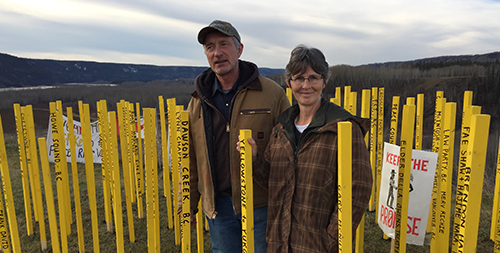Amnesty International is deeply concerned that farm families in northeast British Columbia face the imminent threat of destruction of their homes to make way for a dam that may never be completed.
Although flooding of the Peace River Valley is years away – and may never happen if the incoming provincial government cancels construction of the Site C dam or if significant, outstanding First Nations concerns are finally addressed – a number of farm families face threat of immediate destruction of their homes and lands to allow the relocation of portions of the main road through the valley.
In our view, the circumstances surrounding the construction of the Site C dam are such that any eviction or destruction of homes at this point would breach international human rights standards that all governments in Canada are obligated to uphold.
International law recognizes that there are instances when individuals may need to be displaced from their land for a larger public benefit. However, strict standards are required to protect the rights of those individuals and prevent abuse of power by government.
In an expert commentary on forced evictions in the context of large-scale development projects like hydroelectric dams, the United Nations Special Rapporteur on the Right to Housing has said that governments bear the onus of demonstrating that any eviction is “unavoidable.” This includes fully exploring “all possible alternatives.”
Eviction of Peace Valley farmers to allow the Site C dam to proceed on its current timetable would not meet this test.
First, the Joint Federal-Provincial Review Panel that carried out the environmental impact assessment of the Site C dam clearly established that alternatives to the dam had not been properly considered. The panel specifically criticized BC Hydro and the provincial government for their failure to explore options for energy conservation and alternative sources of power that could potentially eliminate the need for such a destructive project.
In addition, there is no objectively established need to pursue the dam on the current timetable. During the environmental impact process, the Joint Federal-Provincial Review Panel raised serious questions whether projected energy needs warranted the immediate construction of the Site C dam. A spokesperson for BC Hydro has since characterized the dam, which is projected to be completed within the decade, as being built to meet the province’s potential energy needs “20 to 40 years from now.” An independent study recently published by academics at the University of British Columbia argues that delaying completion of the dam until the energy is actually needed would result in a considerable financial saving.
As part of their agreement to collaborate to form the new provincial government, the NDP and Green parties have announced plans to have the economic rationale for the project reviewed by the independent BC Utilities Commission. The outcome of the review could lead to the cancellation of the project if there is a determination that it is not economically viable.
The BCUC review is just one of the uncertainties around the future of the project. BC Hydro and the federal government have acknowledged in court that the legal implications of an historic treaty with First Nations in the Peace Valley, Treaty 8, were not considered prior to the approval of the project. This is despite the fact that the joint environmental impact assessment found that the impact on Indigenous cultural sites and practices would be severe, permanent and irreversible. None of the legal hearings to date have directly addressed this crucial concern. Instead, the courts have said that the question of whether the dam is compatible with Canada’s Treaty obligations needs to be addressed in a different way. This could mean a full civil suit on behalf of the First Nations or intervention by either level of government if they decide to act voluntarily to honour the commitments they have made to the Treaties and international law. In other words, the issue of Treaty violations is still unresolved and still hangs over Site C.
Amnesty International continues to campaign actively for the rights of First Nations in the Peace Valley to be respected and upheld. We believe strongly that the Site C dam must not proceed without free, prior and informed consent as required in Canadian and international law. We also strongly believe that the failure to uphold Treaty 8 must not stand. Current plans for road relocation threaten First Nations graves and cultural sites as well as the family homes of non-Indigenous farmers.






















